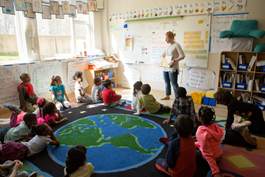Prioritizing Foreign Language Teaching in Elementary Schools

Elementary School Students Learning
Research shows that the most critical time to learn a language is before the age of 8 (National Library of Medicine). Pennridge School District offers foreign language in sixth grade at age 12. Learning another language can strengthen cognitive and problem-solving skills, which is why districts should start teaching foreign languages earlier in the schooling system.
The biggest complication with introducing immersive language programs in elementary schools is finding bilingual teachers and the money to fund the programs. Schools estimate it would cost around $500,00 annually to fund foreign language programs in elementary schools (DiNale). However, the benefits of learning other languages as a child may outweigh the exponential cost of the programs. Stephanie Weise, a kindergarten teacher in the Wissahickon School District, explained, “It would totally be financially worth introducing foreign language programs within our elementary schools. Finding the time as well as the funds might be a challenge, but one worth investigating.” She later mentioned that schools should provide foreign language classes with the same funding as other elective classes because they’re just as important. Learning multiple languages at a young age can improve cognitive processes, thinking, and problem-solving skills, and open children’s minds to new cultures. Not to mention, students could carry their newly learned skills to future studies abroad or within future jobs and careers. Weis added, “Language learning would also broaden our students’ global awareness.”
Others ask themselves if students would be interested in learning other languages at such a young age. Becky Weida, an elementary school teacher in the Pennridge School District, explained, “A lot of the students I interact with tell me they’re trying to learn Spanish to communicate with the other students that don’t speak English. I think the kids would be very excited about it and open to learning.” Introducing foreign languages in elementary schools will improve students’ performances academically and socially. Districts could implement foreign language programs as elective classes in elementary schools. Schools could save funds if they hired bilingual teachers. Foreign language teaching could even be implemented within normal classes such as math, reading, and history. If Districts implement foreign language programs in elementary schools they will have the opportunity to change how children learn and communicate with others, ultimately improving diversity and inclusiveness within schools.
Sources:
Hadley Polson, Grade 12, Interests/hobbies include traveling, skiing, dance, executive council, Key Club, NHS, and hanging out with friends and family....



